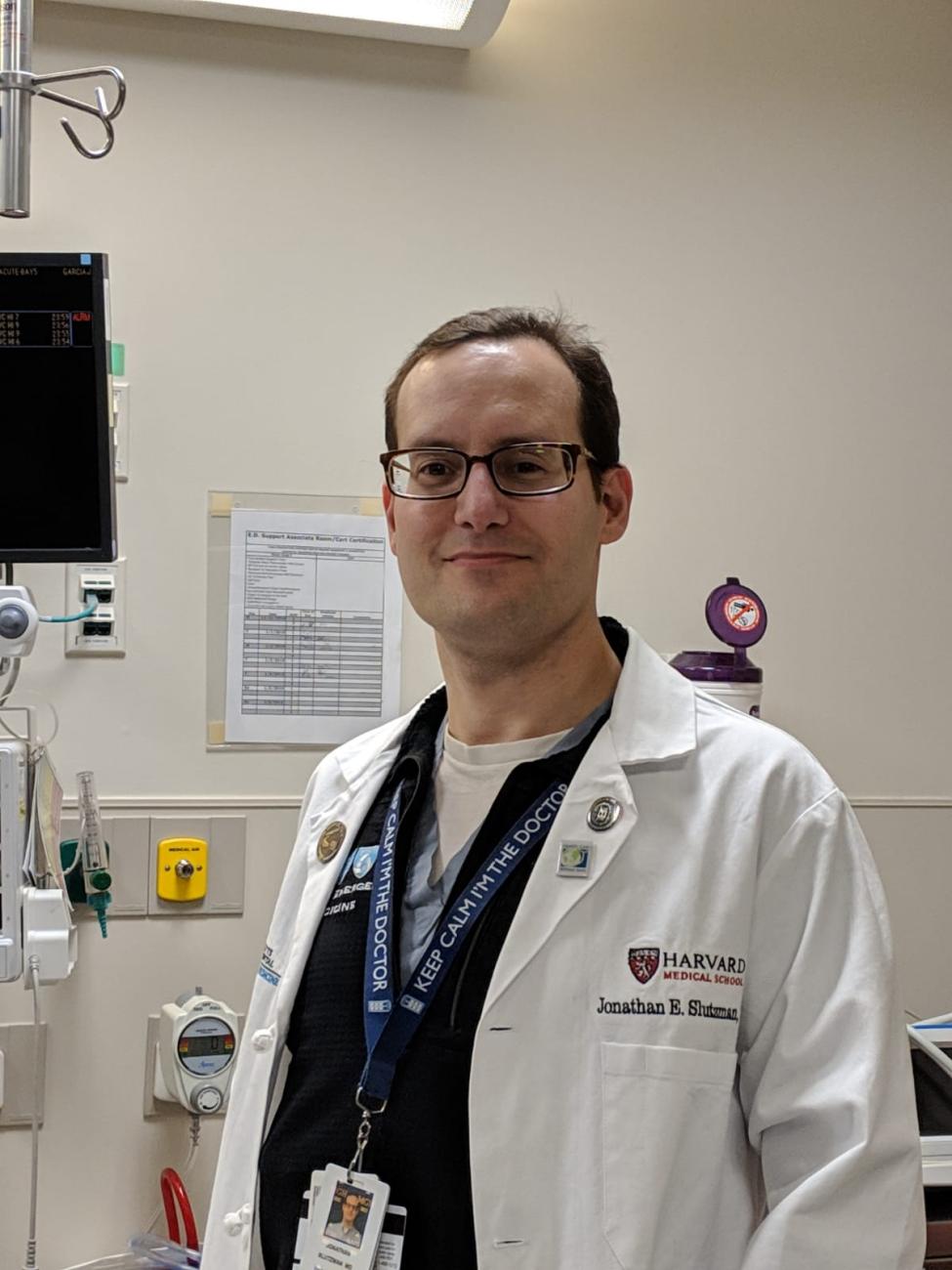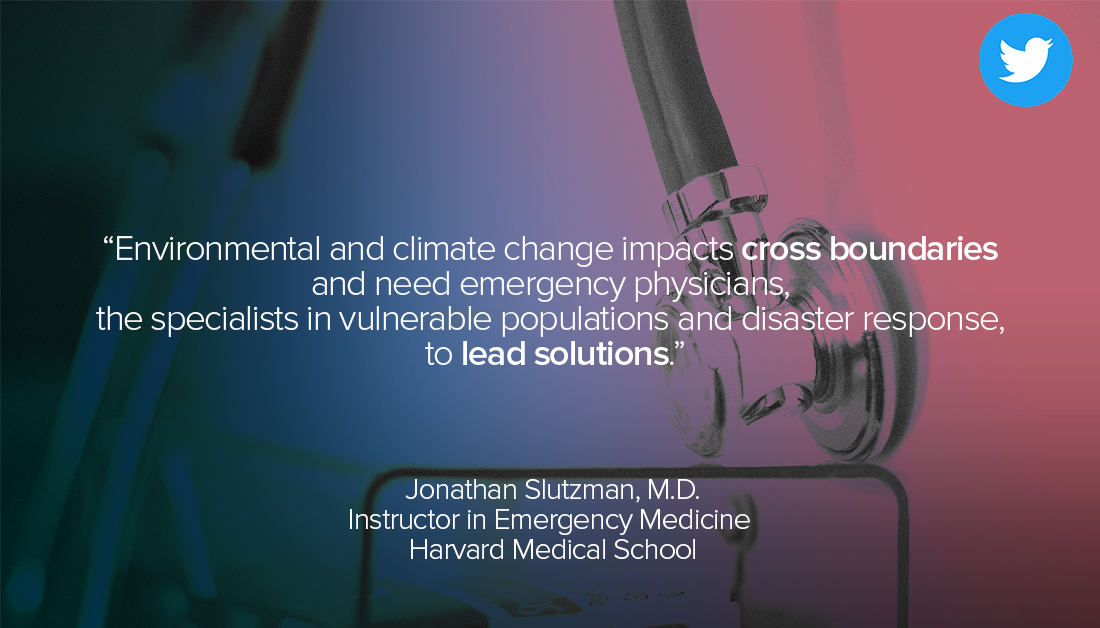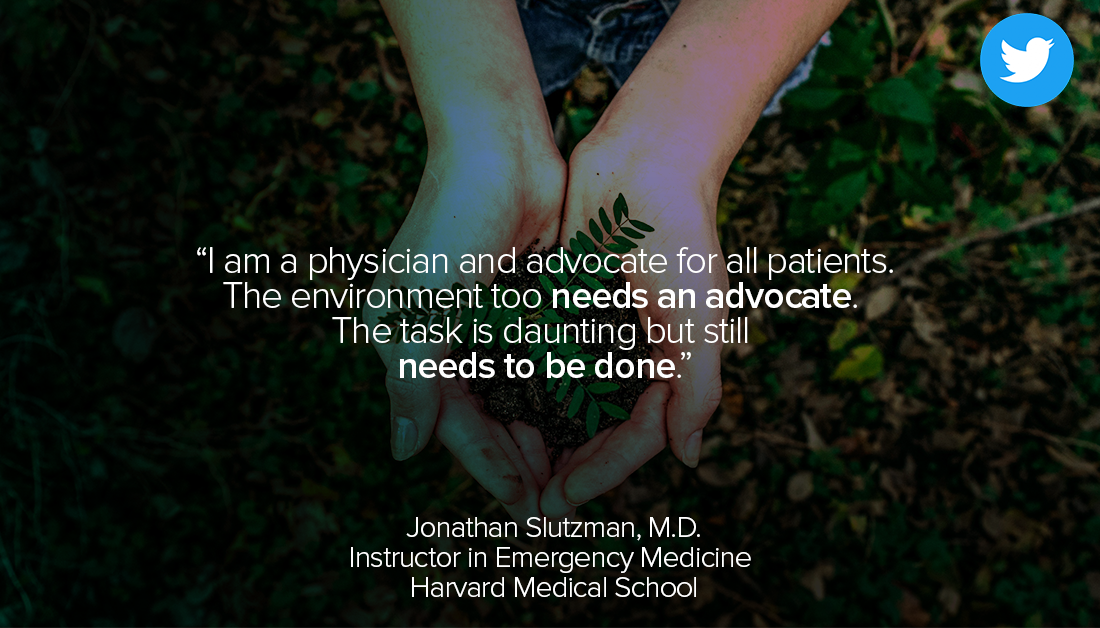Like many physicians in the sustainable health care movement, Dr. Jonathan Slutzman’s interest in
the environment began in his youth. “I was an avid outdoors person, spending weekends camping with the scouts and summers at my grandparents’ 120 acres of woods and farmland,” he recalled.His connection to the outdoors motivated him to design solutions to environmental problems, and he went on to major in civil and environmental engineering at Princeton University, where he also worked as an EMT. “I saw emergency medical care as my hobby and environmental engineering as my career,” he said.
After graduation he worked as an environmental engineer for five years, successfully completing a number of projects and utilizing the life cycle assessment tool to determine the cradle-to-grave environmental impacts of products and processes. But he felt frustrated with his limited ability to affect change.
“My projects just didn’t seem to have the impact I wanted,” he said. Then he realized the solution:
“I knew that I needed to try things the other way around and make emergency medicine my career and environmental matters my hobby.”
So began Slutzman’s second career path. He left his engineering position, graduated from Albert Einstein School of Medicine with distinction in disaster medicine, and completed the Harvard Affiliated Emergency Medicine Residency at Brigham and Women’s and Massachusetts General hospitals.
As a fourth-year resident, while working on a project about the economic costs of emergency medicine with his adviser, they both wondered out loud why one of their emergency departments used reusable suture kits while the other used disposable ones. In that moment, Slutzman recalled his knowledge of life cycle assessments, and realized he had the tools to answer their question.
He began comparing simple health care products and processes from an environmental impact perspective, and he attended his first CleanMed in Boston in 2013.
“I really found my people,” he said of the event.
“I found a community within health care that cared about these things and could be an outlet and support group for bridging my two interests in medicine and environmental engineering.”
Inspired by CleanMed, Slutzman went on to develop a research project comparing reusable and disposable suture kits using a life cycle approach to assess environmental impact. “Not all environmental assessments of health care products can be simply answered by saying that disposables are bad and reusables are good,” he concluded. His research made him aware of the tool’s potential to evaluate and reduce environmental impacts in the emergency department and hospital.
At CleanMed 2018 in San Diego, Slutzman spoke about his research project during a lively session on how suture kits offer a complex example of cradle-to-grave environmental assessment. He is currently an instructor in emergency medicine at Massachusetts General Hospital and Harvard Medical School with an academic focus on the environmental and financial costs of health care. In addition, as a disaster relief professional, he is a volunteer member of the MGH Global Disaster Response Team.
“No single individual physician -- or even a group of physicians -- can change institutional practices,” he said. “Physicians need to educate our leaders to show them why environmental factors should be considered in strategic and tactical decisions."
"I think the key is finding the language that works for each audience. I speak both ‘engineer’ and ‘physician,’ which can help in different encounters.”
As a physician educator, he feels an obligation to share his knowledge about the environmental impact of health care, along with opportunities to reduce the impact. In his recent article on the hidden harm of pollution, he concludes, “As a major contributor to air, water, and other kinds of pollution, health care can damage health even as it heals. By working together to reduce the environmental impact of health care, doctors and patients can keep themselves, their communities, and the planet healthier for generations.”
Slutzman and a small group of emergency medicine physician climate leaders have issued a call to action for the specialty to lead climate and health advocacy, research, and education. Slutzman’s message to his colleagues is straightforward: “Emergency medicine is one of the last few holistic specialties touching on everything in medicine,” he said. “Environmental and climate change impacts cross boundaries and need emergency physicians, the specialists in vulnerable populations and disaster response, to lead solutions.”
His advocacy has even gained an international audience, as he spoke at CleanMed Europe about the role of emergency medicine in promoting climate-smart health care through leadership, mitigation, and resilience, which was summarized in a recent article.
Despite his demanding clinical schedule, Slutzman is motivated to continue his environmental work. “I am a physician and advocate for all patients,” he explained. “The environment too needs an advocate. The task is daunting but still needs to be done.” He cited a Jewish proverb: “It is not your responsibility to finish the work, but neither are your free to desist from it.”
His vision is for every hospital and health care professional to consider sustainability in all building, purchasing, operational, and clinical decisions and to prioritize climate-smart health care as a critical public health imperative. Environmental sustainability should be just as important as financial sustainability, patient safety, and care quality.
“I want to see a sustainability leader in every hospital, with the same attention as is given to quality and safety,” he said. “I want to see hospitals and health centers that generate less waste, emit less pollution, and use less energy. We should be healing our patients and our communities, not harming them.”
Jonathan Slutzman, M.D., is an instructor in emergency medicine at Massachusetts General Hospital and Harvard Medical School with an academic and research focus on the environmental and financial costs of health care. He is the founder and leader of the Partners Healthcare Physician Sustainability Steering Committee and the chair of the Society for Academic Emergency Medicine Climate and Health interest group. He also serves as an advisor to the Health Care Without Harm Physician Network.



